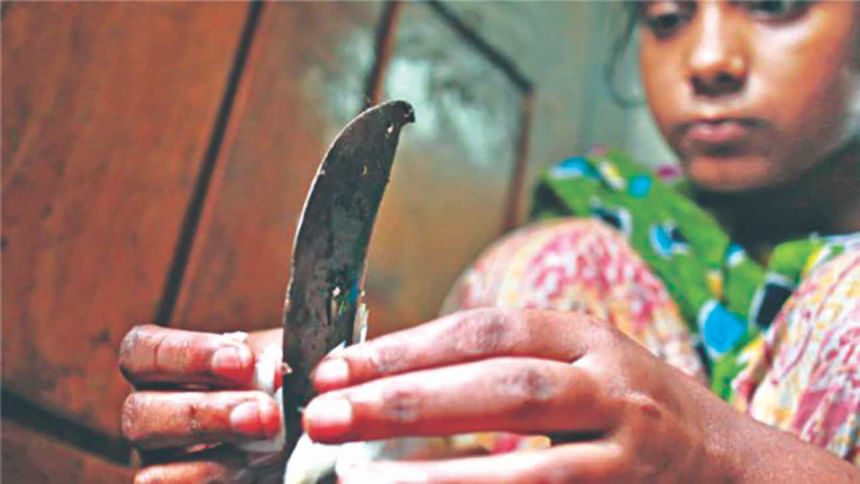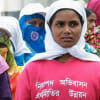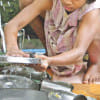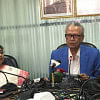Why child domestic workers are prime victims

The photo of a battered young maid with black eyes swollen to the extreme shook the conscience of those who saw it circulating on social media the past week ("Tortured domestic help moved to Dhaka CMH", The Daily Star, July 4, 2017). The child was identified as 11-year-old Sabina Akhter from Tangail district, who was working as a maid in an army officer's house for the last six months in the capital's Mirpur DOHS area. Sabina was taken to the police station after being treated at One Stop Crisis Centre, when it was disclosed that the officer's wife, Ayesha Latif, used to habitually beat her up. Things took a turn for the worse on the morning of June 30 as Ayesha resorted to inflict torture on the little girl with hot kitchen utensils causing severe burns and bruises to her face, wrists, chest and back. Perhaps even more shocking than the brutality of Sabina's ordeal was the triviality of the supposed wrong she was being punished for: failure to fry an egg. She fled with the help of other locals who then took her to the hospital.
Although the gory details of Sabina's torment are indeed nerve-wracking, the torture of domestic help (specifically minor girls) is too frequent an occurrence in Bangladesh for the incident to warrant surprise. According to 2006 baseline survey by the ILO, there are about 420,000 child domestic workers in Bangladesh whose 'employment' usually borders on indentured servitude. Given that the survey was conducted over a decade ago, today's numbers may well be much higher. The vast majority of child domestic workers are minor girls, aged six to seventeen, who are directly sent from their villages to urban areas—completely alien to them—by poverty-stricken parents who perhaps leap at the opportunity of turning an economic burden to a source of income. Their vulnerability only emboldens employers who engage in sadistic acts.
According to a study conducted by Ain o Salish Kendra (ASK), in the period between 2008 to 2011 there were 2,709 reported incidents involving violence against domestic workers, 729 of which led to the death of the child domestic worker ("End Domestic Child Labour", The Daily Star, December 25, 2014). Bangladesh Shishu Adhikar Forum (BSAF) found that the severity of torture ranged from inhuman working hours with no rest to constant beatings (such as hitting the head against the wall, branding lit cigarettes and hot metal objects against raw skin, etc), while some were even raped and as a result committed suicide ("A Desk Review on Child Labour in Domestic Work in Bangladesh", Bangladesh Shishu Adhikar Forum, December 2013). It is important to note that abuse need not be physical in order to amount to torture. Torture can also be of an economic or mental nature (from non-payment of wages to incessant verbal abuse and infliction of trauma) and therefore needs to be recognised and condemned all the same.
We are quick to lambast cruelty against humanity in all other parts of the world while turning a blind eye to the atrocities against domestic workers present in our own communities. Sabina's case itself highly resembles another similarly horrific torture incident from last year. Moni Begum, a school teacher, had severely tortured her nine-year-old maid by burning the poor child all over her body and scalp with a scorching hot metal spatula, simply because she asked for a leave to go visit her parents ("9-year-old brutally tortured", The Daily Star, September 16, 2016). It is high time we realised that torture of domestic help is but an extreme manifestation of our society's wider class problem, which I believe, is rooted in the landowning class's false yet deeply entrenched sense of superiority over the working class people. Just like the trans-Atlantic slave trade dehumanised black people on the basis of race, we dehumanise domestic workers on the basis of their socioeconomic standing. We must also be conscious of the everyday classist microagressions that are rooted in the same strand of dehumanisation and arguably pave the way for such extreme barbarities. This should be part and parcel of our fight against it.
The threshold of humane treatment is not simply met by abstaining from torturing the help. Our condemnation of the plight faced by domestic workers would be somewhat hypocritical if it is not also followed by a little bit of introspection. So while we hurl (much deserved) insults at the likes of Ayesha and Moni, let us also ask ourselves: how humanely are domestic workers, particularly child workers, treated under our own roof? And while we hope that justice is served to Sabina and her torturer, let us seriously take a moment to ponder: how many more child workers are suffering abuse and torture in utter silence, behind the closed mahogany doors of 'civilised' homes?
Taqbir Huda is currently working as a Research Officer at Bangladesh Institute of Law International Affairs (BILIA) and volunteers at Bangladesh Society for the Enforcement of Human Rights (BSEHR- Manabadhikar).

 For all latest news, follow The Daily Star's Google News channel.
For all latest news, follow The Daily Star's Google News channel. 








Comments